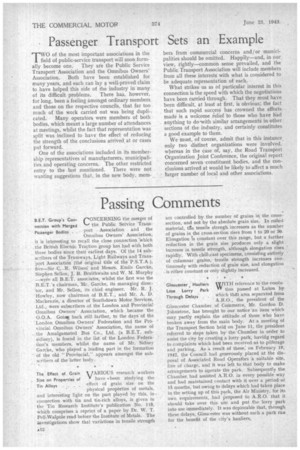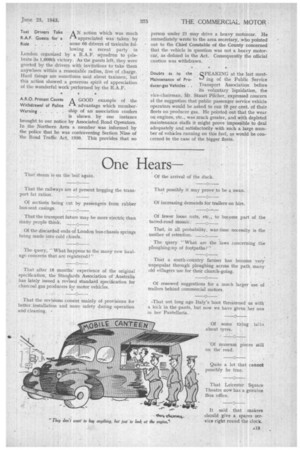Passing Comments
Page 14

Page 15

If you've noticed an error in this article please click here to report it so we can fix it.
CONCERNING the merger of the Public Service Transport Association and the Omnibus Owners' Association, it is interesting to recall the close connection 'which the British Electric Traction group has, had with both these bodies since their earliest days. Of the 14 subscribers of the Tramways, Light Railways and Trans. port Association' (the original title of the•P.S.T.A.), five—Sir C.. R. Wilson' and Messrs. Emile Garcke, Stephen Sellon, J. B. Braithwaite and W. M. Murphy —were all B.E.T. associates, whilst the first was the I3.E.T.'s chairman, 11r. Garcke, its managing director, and Mr. Sellon, its chief engineer. Mr. R. J. Howley, now chairman of B.E.T., and Mr. A. D. Mackenzie, a director of Southdown Motor Services, Ltd., were subscribers of the London and Provincial Omnibus Owners' Association, which became the 0.0.A. Going back still farther, to the days-of the London Omnibus Owners' Federation and the Provincial .Omnibus Owners' Association, the name of the Amalgamated Bus Co., Ltd. (a B.E.T. subsidiary), is found in the list of the London Federation's members, whilst the name of Mr. Sidney Garcke, who played a leading part in the formation of the old "Provincial," appears amongst the subscribers of the latter body. , B.E.T. Group's Connection with Merged Passenger Bodies . .
The Effect of Grain VARIOUS research workers Size on Properties of v have +been studying the Tin Alloys . . . effect of grain size on the physical properties of metals, and interesting light on the part played by this, in connection with tin and tin-rich alloys, is given in the Tin Research Institute's publication No. 118, which comprises a reprint of a paper by Dr. W. T. Pell-Walpole read before the Institute of Metals. The investigations show that variations in tensile strength
are controlled by the number of grains in.-the crosssection, and not by the absolute grain size. In rolled material, tne tensile strengh increases as the number of grains in the cross-section rises from 1 to 20 or O. Elongation Is constant over this range., but a further reduction in the grain size 'produces only a slight increase in tensile strength, although elongation rises rapidly. With chill-,cast specimens, consisting entirely of columnar grains, tensile strength increases continuously with reduction of grain size, and elongation is either constant or only slightly increased.
Gloucester Hauliers WITH reference to the resolu Lose Lorry Park " tion passed at Luton 11:er. Through Delays . . which thdt area separated from A.R.O., the president of the Gloucester Chamber of Commerce, Mr. Gordon D. Johnstone, has brought to our notice 'an item which may partly explain the attitude of those who have broken away from the main body. At a meeting of the Transport Section held on June II, the president referred to steps taken by the Chamber in order to assist the city by creating a lorry park, having regard to complaints which had been received ai to pilferage and parking. As a result of these; on February 19; 1942, the Council had generously placed at the disposal of Associated Road Operatbrs a suitable site, free of charge, and it was left to that body to make arrangements to operate the park. Subsequently the Chamber. had assisted A.R.O. in every possible way and had maintained contact with it over a period of 15 months, but owing to delays which had taken place in the setting up of this park, the Air Ministry, for its own requirements. had Proposed to A.R.O. that it should take over this site and put the lorry park into use immediately. It was deplorable that, through these delays, Gloucester was without such a park run for the benefit of the city's hauliers, Taxi Drivers Take A N action which was much
R.A.F. Guests for a appreciated was taken by Ride some 60 drivers of taxicabs fol lowing a recent party in London organized by a R.A.F. squadron to celebrate its 1,000th victory. As the guests left, they were greeted by the drivers with invitations to take them anywhere within a reasonable radius, free of charge. Hard things are sometimes said about taximen, but this action showed a generous spirit of appreciation of the wonderful work performed by the R.A.F.
A.R.O. Protest Causes A GOOD example of the Withdrawal of Police /Th advantage which member
Warning ship of an association confers is shown by one instance brought to our notice by Associated Road Operators. In the Northern Area a member was informed by the police that he was contravening Section Nine of the Road Traffic Act, 1930. This provides that no person under 21 may drive a heavy motorcar. He immediately wrote to the area secretary, who pointed out to the Chief Constable of the County concerned that the vehicle in question was not a heavy motorcar, as defined in the Act. Consequently the official caution was withdrawn.
PEAKING at the last meet ing of the Public Service Transport Association before its voluntary liquidation, the vice-chairman, Mr. Stuart Pilcher, expressed concern at the suggestion that public passenger service vehicle operators would be asked to run tO per cent. of their fleets on producer gas. He pointed out that the wear on engines, etc., was much greater, and with depleted maintenance staffs it might prove impossible to deal adequately and satisfactorily with such a large number of vehicles running on this fuel, as would be concerned in the case of the bigger fleets.
Doubts as to the Maintenance of Producer-gas Vehicles . .




















































